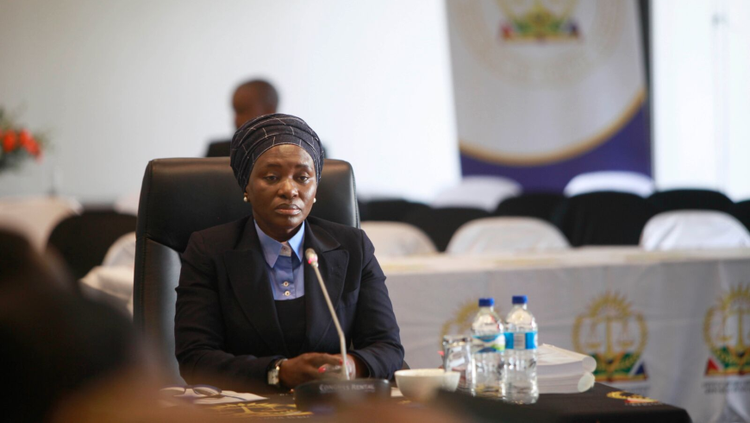
Judge Tintswalo Nana Makhubele has lodged a complaint against Judge Neil Tuchten after he wrote a judgment criticising her. Photo courtesy of Judges Matter
30 April 2019
Judge Tintswalo Nana Makhubele has lodged a complaint with the Judicial Conduct Committee against Judge Neil Tuchten for “defamatory statements and unwarranted criticisms” against her.
In his November 2018 Pretoria High Court judgment in the case between Passenger Rail Agency of South Africa (PRASA) and Siyaya Rail Solutions, Tuchten wrote that Makhubele “ought not to undertake any judicial duties until she clears her name of the allegations against her.”
The judgment said that Makhubele had disrupted litigation procedures within PRASA by instructing Ground Legal Services (GLS), an internal body of the rail agency, to stop its participation in the Siyaya litigation. At issue in the case was a R56-million payment by PRASA to Siyaya.
“I am sorry to say that I must say something about the conduct of Judge Makhubele as evidenced by these papers,” wrote Tuchten. “There are questions which demand answers.” One of these questions was: “Did she supply Siyaya with information which they could use against PRASA, and if so, why?” He further wrote: “In general, did she act with propriety in relation to the Siyaya litigation?”
Makhubele became chair of the PRASA interim board after being appointed a High Court judge. This conflict of interest was uncovered by commuter activist group #UniteBehind.
She consequently resigned from the board in March 2018.
Tuchten’s judgment stated: “Did she disclose in her application for judicial appointment that she was considering taking up an appointment as PRASA chair, which would prevent her from performing the duties of a judge until she gave up her position at PRASA?”
In her complaint against Tuchten, Makhubele wrote: “Although he did not make adverse findings on the allegations made by the GLS against me, the manner in which he phrased the questions, the context and his contempt of me as a judge, it is clear that he believes that I am guilty of the alleged wrongdoings.”
Makhubele claimed that Tuchten had breached multiple provisions in the Code of Judicial Conduct, including equal protection and benefit of the law.
Makhubele implied that Tuchten’s judgment against her was affected by racial bias. She wrote in her complaint, “Why did Judge Tuchten single me out? Is it because I am a woman? A black woman? The others are white males.”
“In fact, his judgment constitute hate speech,” she stated.
She also wrote that Tuchten had violated judicial independence by considering the views of #UniteBehind to reach his judgment. Tuchten had also denied her right to fair trial by failing to call on her to answer, according to Makhubele.
In a memorandum in response to the complaint, Tuchten wrote, “I did not make any findings or display any animus against the complainant … If I had considered making findings against the complainant, of course I would have given her an opportunity to be heard.”
He denied that his judgment constituted hate speech and asserted that Makhubele’s accusation of racial bias was “unfounded.”
“The judgment reflected my honest opinions,” Tuchten wrote. “I do not think the Committee is empowered by law to enquire into the conduct of judges who express their honest opinion in a judgment. If the Committee did so, I believe it would be infringing the separation of powers doctrine.”
Tuchten said that he had offered to take leave until the complaint against him was resolved, but the Judge President declined his offer.
GroundUp requested comment from both judges via the spokesperson for the judiciary. We received a response (via the spokesperson) that Judge President of the Gauteng High Court, Dunstan Mlambo, said it would be premature for either of the judges to speak publicly about the matter.